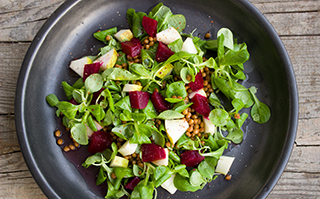 If you have ever been confused about what or how much carbohydrate you should eat, don’t stress.
If you have ever been confused about what or how much carbohydrate you should eat, don’t stress.
You are among many other people who are feeling the same way. At the end of the day, there is no magic amount or type of carbohydrates that is going to work for everyone and frankly, if someone is saying that there is, I’d be suspicious. Unfortunately, there is a lot of conflicting information that sometimes doesn’t add up. It’s confusing and frustrating because you just want to eat well and it all just gets a bit tricky.
When considering carbohydrate intake, there are some points that will help you understand the quality of carbohydrates and the impact it can have on your diet long term.
- The type e.g. complex like starch and fibre vs. simple like sugars
- How processed it is
- Portion size
If you are interested in getting into the nitty-gritty of carbohydrates, have a read of some of these topics, All About Carbs , Fruit Sugars and Processing Carbs. If that kind of detail isn’t for you, don’t worry about it because you can eat well without studying human biochemistry!
The amount of carbohydrate is important and a simple place to start. It is specific to each individual and there are a few factors to take into consideration to find how much works for you. You’re probably closer than you think, to eating the right amount of carbohydrates for you. More often than not, you won’t need to make any drastic changes to your intake. It might just be a case of adding some extra veggies to your plate instead of extra pasta. However, there are some specific times when following a low carb diet could be beneficial. If you’re curious about when that might be, have a read of When Should You Follow a Low-Carb Diet.
With all this focus on carbohydrates, sometimes we forget about protein, fat, fruits and veg. Whatever amount of carbohydrates work for you, it’s also worth thinking about those other components of your diet as they are equally important.
The main thing to think about with a lower carbohydrate day is not trying to cut carbs completely but focus on swapping in more veggies and protein and reducing your portion sizes or the frequency of eating carbohydrate rich foods. There are similarities between the two days but by making small changes, like swapping out the toast at breakfast and legumes at dinner, you’ll be able to lower your overall carbohydrate intake without sacrificing the quality of your diet or your enjoyment of the meal!
Even after these examples and information, it’s important to remember that your diet is very personal. Research actually shows that the best healthy diet for you is the one that you can follow long term. Whether you follow a moderate carbohydrate intake or a low carbohydrate intake matters less than being able to consistently stick to eating habits that help you get plenty of nutrients in the right amounts for you.
Sometimes we end up eating a certain way because we saw a diet on the internet, or a friend was raving about how healthy it is. Maybe the diet works or maybe restriction around certain foods and the stress that it can cause around eating ends up outweighing any health benefits you were hoping to achieve and in the end, it is not sustainable. It takes some effort and practice but building a healthy diet from foods you will realistically eat and really enjoy is very possible. If you want some help, head to The Healthy Eating Hub for some great recipe ideas or book in a consultation for guidance that is relevant to you, on how to make confident and healthy food choices.
Here are two examples of full days of meals, one with a moderate amount of carbohydrate and one with a lower amount carbohydrate. Both days are providing you with those serves of protein, fat, fruit and veg and are both HEALTHY to follow long term.
Moderate carbohydrate intake |
Lower carbohydrate intake |
|
Breakfast: Snack: Lunch: Snack: |
Breakfast: Snack: Lunch: Snack: Dinner: |
This article is written by Camille Struzina, Intern at The Healthy Eating Hub


